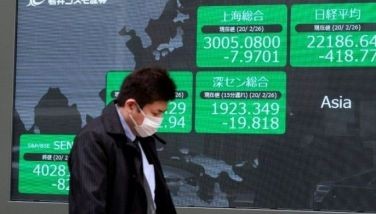Truck ban: Discouraging potential investors
You may not be aware but we are among the laggards in the ASEAN as far as generating Foreign Direct Investments (FDIs) is concern. Historical data will help us sort this out. As reported by the World Bank through the East Asia Pacific Economic Update earlier last year, the ASEAN region has been the largest recipient of FDIs in Asia Pacific.
However, since 1952 until 2012, “Singapore accounts for more than half of total FDIs to the whole region at 52%. Thailand ranks 2nd with 13%, followed closely by Indonesia at 3rd with 11%, at 4th is Malaysia with 10%, Vietnam (the once war-torn country) ranks 5th with 8%, and the Philippines is 6th with a miserable 3%”.
Worse for us, lately, communist country Vietnam (remember, communism hates capitalism) made some policy changes as far as foreign investments are concerned. In some industries that were used to be controlled, they’ve raised foreign ownership from 49% to as high as 60%. Good enough for foreigners to take control of their investments or businesses. Cambodia and Myanmar are contemplating of following Vietnam’s approach too.
In us, it shall be a long and arduous climb. Remember, our constitution limits foreign ownership to 40% in some undertakings and in land ownership. Most of these undertakings usually involve natural resources and public utilities. These restrictions are clearly manifested in the Foreign Investments Negative List (FINL). This is a list of all business activities where foreigners are either restricted or banned. The present administration has no intention of amending the constitution nor remove some restrictions in the FINL. Therefore, with Vietnam’s, Myanmar’s and Cambodia’s recent moves of easing foreign ownerships, our chances to corner more FDIs will certainly go further down.
Worse, unknown to most us, apart from ownership restrictions, truck ban is, likewise, a big issue for potential investors, especially to those companies in the manufacturing industry. These are efficiency-oriented manufacturing companies that move their raw materials and finished goods continuously twenty four hours a day. With the truck ban, these efficiency-oriented practices are impossible to implement.
Remember, our traffic situation is known worldwide through a study of Japan's International Cooperation Agency or JICA. To recall, in 2012, JICA’s study revealed that “the time lost by people within the traffic jams plus the cost of operating vehicles in Metro Manila and neighboring towns add up to around P2.4 billion per day”. Well, that was three years ago. Today, it could run to P3 billion a day.
One may argue though that despite all these restrictions and hindrances, we are still cornering some investments. That we’ve gathered substantial investments through the Philippine Economic Zone Authority (PEZA). This is, indeed, true, as major cities, like Metro Manila and Cebu, have become havens of FDIs. Notably, however, these FDIs have been so focused only on business process outsourcing (BPO). Moreover, this kind of investment (BPO) is just a rung higher than portfolio investments or “hot money”.
Why are we getting FDIs that are so BPO-focused isn’t difficult to decipher. These BPOs are mostly 100% foreign owned and by the nature of their businesses (export of services) are allowed by law to be such. Since they don’t need to construct manufacturing plants or factories but just rent offices, and don’t need raw materials nor have finished goods to move, then, the circumstances suit them. By the same token, FDIs that are geared towards manufacturing activities are hesitant.
For one, they won’t pour in millions of investment and construct buildings on lots that they can’t own. As the law provides, they need to have partners in a 60:40-corporation and with them as minority to buy land. As the story has always been, they use dummies and, more often, end up in court for ownership battles. Consequently, they are discouraged and are discouraging other prospective investors to invest.
Despite all these restrictions or discouraging experiences with dummies, however, there are still some investors in the manufacturing industry who, fortunately, are finding reliable local partners. After doing their due diligence, however, and discovered our worsening traffic conditions and our only temporary solution (truck ban), they backed out. They would like to operate 24/7 and shall, therefore, need to move raw materials and finished goods the same way. A minute less, for them, is entirely unacceptable. Thus, with the truck ban so prominent, they are discouraged to invest. They don’t want to add to the growing statistics of losses brought about by these sickening traffic jams and the traffic czars’ “truck ban” solution.
Consequently, we miss the opportunity for inclusive growth. The opportunity for employment of the less educated and the poorest of the poor that only manufacturing firms can give.
- Latest





















